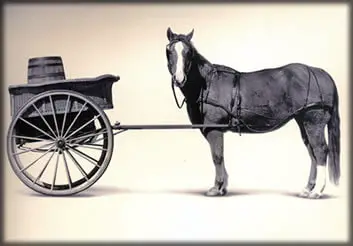Reverse the accepted or logical order of things.
Put the cart before the horse
What's the meaning of the phrase 'Put the cart before the horse'?
What's the origin of the phrase 'Put the cart before the horse'?
The accompanying horse and cart image looks preposterous. That’s as it should be as the word ‘preposterous’ entered the English language precisely to describe such back to front imagery. Of course, ‘pre’ derives from Latin and is a standard prefix, that is, it is ‘at the front’. Likewise, the Latin ‘post’ means ‘at the back’, so ‘preposterous’ actually denotes the normal arrangement of things, with the front at the front and the back at the back. ‘Postprerous’ might have been a better choice of word but, like ‘‘head over heels’, which also makes no sense, it’s too late to change now.
The earliest known reference to ‘putting the cart before the horse’ comes in John Heywood’s A Dialogue conteinyng the nomber in effect of all the Prouerbes in the Englishe tongue, 1589:
To tourne the cat in the pan, Or set the cart before the hors.
Heywood was there comparing two things that were similarly nonsensical – cooking a cat and putting the cart before the horse.
A hysteron proteron is a figure of speech we inherited from the Greeks, in which the thing that should come second is put first; for example, ‘putting on one’s shoes and socks’. It isn’t surprising that, when needing an Anglicised proverb to express that notion, the English turned toward what they knew best, that is, agriculture, and in particular, horses. There are more ‘horse phrases‘ in English than those referring to any other animal, including ‘man’s best friends’, dogs.
The notion of things being the opposite of what they rightfully should be seems to have played on the minds of the English at the time when modern English began to be formed, that is, in the 16th century. It is a common theme in Shakespeare and The Tempest, Macbeth and A Midsummer Night’s Dream all contain ‘world turned upside down’ magical elements.
Other ‘back to front’ English phrases include ‘the tail is wagging the dog’, ‘upside down‘, ‘topsy-turvy‘ and ‘inside out‘.
See also: The Preposterous.
See other ‘Don’t…’ proverbs:
Don’t cast your pearls before swine
Don’t change horses in midstream
Don’t count your chickens before they are hatched
Don’t cut off your nose to spite your face
Don’t keep a dog and bark yourself
Don’t let the cat out of the bag
Don’t look a gift horse in the mouth
Don’t shut the stable door after the horse has bolted
Don’t throw good money after bad
Don’t throw the baby out with the bathwater
Related phrases and meanings
Browse more Phrases
About the Author

Phrases & Meanings
A-Z
A B C D E F G H I J K L M N O P Q R S T UV W XYZ
Categories
American Animals Australian Bible Body Colour Conflict Death Devil Dogs Emotions Euphemism Family Fashion Food French Horses ‘Jack’ Luck Money Military Music Names Nature Nautical Numbers Politics Religion Shakespeare Stupidity Entertainment Weather Women Work
How did we do?
Have you spotted something that needs updated on this page? We review all feedback we receive to ensure that we provide the most accurate and up to date information on phrases.
